Recent arrest of Pakistani ‘kingpin’ highlights the international menace of passport forgers, writes Maxmilian Wechsler
| TERRORISTS, fugitives, drug smugglers and illegal arms dealers are among those using passports stolen in their millions across the globe to assist in their criminal activities. Ronald Noble, Secretary-General of Interpol, the world’s largest international police organization, once called passport fraud the “biggest threat facing the world.” Thailand has unfortunately gained a reputation as one of the major centers for the forgery/alteration and trade of stolen passports. A number of foreign syndicates based in Thailand are buying and selling stolen passports – both altered and unaltered – for use mainly by criminals based in other countries. The syndicates set up shop here because until recently this very profitable enterprise has been given little attention by the Thai authorities. |
A new unit established by the Department of Special Investigation (DSI) to target these gangs hopes to cancel their profits and their ability to operate in the Kingdom. Called the Transnational Crime Intelligence Operation Centre (TCIC), under the Bureau of Foreign Affairs and Transnational Crime, the new unit is staffed by highly experienced and dedicated investigators who, prior to joining the unit, all scored notable successes against the highly sophisticated gangs.
Tinawut Slilapat, who leads the unit, said: “The syndicates are well organized and sophisticated, so it’s important to have a law enforcement agency whose personnel are able to gather accurate intelligence which can suppress their networks. With the formation of the TCIC, passport syndicates who have been active in Thailand for decades might now be spending decades behind bars.”
Tinawut Slilapat, who leads the unit, said: “The syndicates are well organized and sophisticated, so it’s important to have a law enforcement agency whose personnel are able to gather accurate intelligence which can suppress their networks. With the formation of the TCIC, passport syndicates who have been active in Thailand for decades might now be spending decades behind bars.”
| High-profile arrests Mr. Tinawut and his team have gained international recognition for cracking some major passport cases. The most high-profile of these resulted in the arrest and conviction of Muhammad Ather Butt, known as Tony, a Pakistani national. Also arrested were his wife and two other Pakistani nationals. Mr. Butt was the leader of a gang which had operated out of Thailand for 10 years, supplying passports and fake documents to terrorists and other criminals. He and his Thai wife were arrested in Nong Khai on November 30, 2010, as they were about to cross the border into Laos. It was a routine trip for the pair as they normally went to Laos once a month to deliver passports to customers. The operation, called Operation Alpha by DSI, created headlines around the world after the gang was linked to terrorist groups in Spain responsible for several bombing and arson attacks, including the 2004 Madrid train bombings that killed 191 people. The gang also allegedly provided forged passports for the Pakistan-based Lashkar-e-Taiba group, which has been accused of plotting the November 2008 Mumbai attacks, in which 10 militants killed at least 164 people and injured more than 300, and to the Liberation Tigers of Tamil Eelam separatist group in Sri Lanka. “Mr. Butt was labeled as the ‘kingpin’ of the trade and he was the biggest operator in Thailand,” said Mr. Tinawut. “His business expanded year after year until he was the most famous passport forger in Thailand. Everyone in the business admired and feared him because he developed contacts with some influential Thai officials and had a lot of money. |
“After the arrests, we searched Mr. Butt’s two-room apartment in Rat Burana in Bangkok. One room was like a small factory, with computers, a high-definition scanner, and a printer. We found almost 1,000 pieces of evidence, including passports from several countries, photos, counterfeit data pages for EU, Canadian, Chinese and Israeli passports, visa stickers for the US and Schengen Agreement countries and various visa stamps,”
Mr. Tinawut said.
“Among the seizures were over 100 passport-size photos of people who look like they are from the Middle East. These photos were sent to him by post and by other means, probably to insert into stolen passports.
“He selected Thailand as a base because it is easy to enter and leave and, more importantly, some officials don’t regard passport forgery as a serious offence. Their attitude is, ‘they are dealing only with foreign passports, but not Thai, so why should we worry.’
“Mr. Butt had been doing this business for 10 years, so you can imagine how big his network was and how many customers he had. Hundreds of people in many countries, including in the Middle East were involved with his group, which comprised about 10 people,” Mr. Tinawut added.
On June 13 this year Mr. Butt was convicted and sentenced by the Criminal Court to 31 years in prison, but as he confessed to his crimes the sentence was reduced to 15 years and 6 months. His two accomplices received 24 and 21 years in prison but because they also confessed, their sentences were similarly reduced. Mr. Butt’s wife has made no confession and her case will go to trial.
The TCIC led the investigation of another recent major passport fraud bust -- a joint operation also involving the Pattaya Tourist Police, Special Branch police and the Narcotic Suppression Bureau, with the assistance from the Canadian Border Services Agency. The collaboration resulted in the arrest of Iranian national Seyed Ramin Paknejad in Pattaya on June 8. Mr. Seyed was high on the wanted lists of international law enforcement
agencies.
According to Mr. Tinawut, Mr. Seyed is suspected of being the leader of a syndicate that has been forging and selling passports on a large scale for eight or nine years. His illegal activities enabled hundreds of cases of illegal migration and human trafficking from Thailand to many destination countries, including EU, US and Australia.
Computers seized from his condominium in Central Pattaya and a small house he rented in Naklua held a database of thousands of people who had already been issued passports. Police also discovered counterfeiting equipment, bio-pages for passports, visa stickers and other forged documents.
Also seized were a shotgun and a brown powder believed to be heroin. Police suspect that Mr. Seyed provided passports to foreign drug couriers and that he had been involved in passport fraud in Thailand for almost a decade.
Much to the surprise of the DSI and other law enforcement agencies involved in the case, Mr. Seyed was granted bail by the Pattaya Provincial Court on June 13.
Mr. Tinawut said.
“Among the seizures were over 100 passport-size photos of people who look like they are from the Middle East. These photos were sent to him by post and by other means, probably to insert into stolen passports.
“He selected Thailand as a base because it is easy to enter and leave and, more importantly, some officials don’t regard passport forgery as a serious offence. Their attitude is, ‘they are dealing only with foreign passports, but not Thai, so why should we worry.’
“Mr. Butt had been doing this business for 10 years, so you can imagine how big his network was and how many customers he had. Hundreds of people in many countries, including in the Middle East were involved with his group, which comprised about 10 people,” Mr. Tinawut added.
On June 13 this year Mr. Butt was convicted and sentenced by the Criminal Court to 31 years in prison, but as he confessed to his crimes the sentence was reduced to 15 years and 6 months. His two accomplices received 24 and 21 years in prison but because they also confessed, their sentences were similarly reduced. Mr. Butt’s wife has made no confession and her case will go to trial.
The TCIC led the investigation of another recent major passport fraud bust -- a joint operation also involving the Pattaya Tourist Police, Special Branch police and the Narcotic Suppression Bureau, with the assistance from the Canadian Border Services Agency. The collaboration resulted in the arrest of Iranian national Seyed Ramin Paknejad in Pattaya on June 8. Mr. Seyed was high on the wanted lists of international law enforcement
agencies.
According to Mr. Tinawut, Mr. Seyed is suspected of being the leader of a syndicate that has been forging and selling passports on a large scale for eight or nine years. His illegal activities enabled hundreds of cases of illegal migration and human trafficking from Thailand to many destination countries, including EU, US and Australia.
Computers seized from his condominium in Central Pattaya and a small house he rented in Naklua held a database of thousands of people who had already been issued passports. Police also discovered counterfeiting equipment, bio-pages for passports, visa stickers and other forged documents.
Also seized were a shotgun and a brown powder believed to be heroin. Police suspect that Mr. Seyed provided passports to foreign drug couriers and that he had been involved in passport fraud in Thailand for almost a decade.
Much to the surprise of the DSI and other law enforcement agencies involved in the case, Mr. Seyed was granted bail by the Pattaya Provincial Court on June 13.
| Rapid response to transnational crime The TCIC is a small and highly specialized division of the DSI, formed to respond rapidly to highly sophisticated transnational crimes, especially those involving migration offences. Its parent organization, the DSI, which was set up in October 2002, is a civilian law enforcement agency under the Ministry of Justice and modeled upon the US-based Federal Bureau of Investigation, with a mission to investigate complicated and sophisticated crimes. Mr. Tinawut served with the Special Branch police before joining the DSI in 2004, and has been investigating mainly passport fraud since 2008. He is confident that TCIC will be an effective deterrent against the passport syndicates. With a couple of successful operations besides the two mentioned above already under his division’s belt, the confidence seems justified. |
“The unit presently consists of eight officers who are specialists in various fields of law enforcement. We have authorization for 15 officers, so we will recruit seven more specialists. The quality of our officers is more important than their number. The structure of the TCIC is designed to respond to transnational and organized crime using primarily intelligence capabilities.
“The TCIC is divided into three sections: Intelligence Administration and Coordination; Data Management and Network Systems Development; and Operations.
Each section will eventually be assigned five investigators.
“After we recruit more specialists, we will expand from migration crimes to other transnational crimes. As for the former, we now have a lot of valuable information. We are involved in migration fraud that includes forgery and alteration of passports and other identification documents.
Most of our work deals with organized crime involving foreigners and requires cross-border investigation.
“Terrorists, drugs or weapon smugglers, or people committing other crimes obviously don’t want to use their own identification documents. We are focusing on syndicates who have the resources and manpower to commit serious crimes, not on one individual who decided to
commit a crime.
“We are also cooperating with about 10 foreign law enforcement agencies and a number of local ones. International cooperation is very important and crucial to put a stop to these kinds of criminal activities. According to the Special Case law, the DSI can request assistance from any Thai government agency. I must say that we are receiving excellent cooperation from all Thai government agencies.
“Migration fraud is usually complicated and cases require a lot of time to crack. We are looking for the kingpins, and not out to arrest a courier or a worker. Normally it takes six to eight months to conclude an operation.”
Mr. Tinawut said intelligence gathered by his division indicates there are about 20 foreign groups that deal mainly with passport fraud in Thailand at this time, and they are spread all over the country.
“Nationals from South Asian and Middle Eastern countries are most likely to be involved in passport fraud, and to lead syndicates,” said Mr. Tinawut.
He added that some of the leaders of these gangs came here 20 years ago or more and started legal enterprises such as jewelry shops, tourist agencies, import-export and garment businesses, which became fronts for criminal activities.
“We have six cases at this moment. We are constantly collecting intelligence from local and foreign sources. We have seized over 1,000 passports, some already altered, from 10 countries. About 90 per cent are stolen, but some are sold by the owners.”
The gangs supply passports to customers inside and outside Thailand. Clients often travel here to purchase passports or they are delivered by couriers. With few exceptions the passports are used to commit crimes outside of Thailand. Sometime passports are stolen abroad and sent to Thailand for alterations, such as replacing photos, said Mr. Tinawut. Counterfeiters will also supply other fake ID items such as drivers’ licenses.
“It is hard to identify which people come here with bad intentions,” said Mr. Tinawut. “Most foreigners arrive here on tourist visas and it is hard to check the criminal background of every foreigner at the immigration checkpoints. Tens of thousands of people arrive, transit or depart everyday at airports and other checkpoints.
“Secondly, it is easy for criminals to find a Thai partner and use them as an assistant, for example to open bank accounts in order to conceal assets obtained by committing criminal activities. When the police arrest the criminal they can’t seize his or her assets immediately because they are in the name of a Thai person who usually has no legal connection to the criminal, even though they may be living together.
“Finally, it is easy to buy any kind of sophisticated equipment in Thailand to make forgeries. All you need is money, and we are talking about a very lucrative revenue source for criminal organizations.
“One stolen passport, if in good condition and with three to five years left before its expiration date, sells for US$1,500 to $3,000, with extra charges for changing photos, adding counterfeit Schengen stickers, rubber stamps, etc.”
Criminals adopting ‘imposter’ strategy
Mr. Tinawut said the syndicates don’t just sell counterfeit passports, as they did in the past, but often add only some counterfeit parts. What’s more, stolen passports are increasingly sold without the syndicates changing anything. In such a case the passport will be used by a person of similar appearance, an imposter who hopes to fool officers at immigration checkpoints, whether departing, transiting or arriving.
“In these cases the passport gangs don’t change the photo or any other information,” said Mr. Tinawut. “They just look through their stock of passports and select a suitable one to fit the customer. So the passport is genuine in every way. It is the person using it who is the fake,” said Mr. Tinawut.
This development makes it very difficult for law enforcement agencies. “If you have another person’s passport in your pocket, I can’t arrest you because I have to first prove the passport was stolen, altered or counterfeited. Only the embassy can confirm that and this is logistically impossible find out on the spot. It takes time. The criminals know this.
“The bosses behind the transnational crime syndicates are professionals. They know the weak points of law enforcement, the gaps in the law, and the limits of our regulations, and they know how to exploit them.
“The technique of law enforcement today should be to develop intelligence. We never enter the wrong premises when making an arrest or a search because before we go we know exactly who is there and what kind of illegal items we will find.
“After we make arrests and seize evidence, we will examine everything, check all phone numbers and email addresses that have been used. They can lead us to other members of the syndicate or to other syndicates. The people behind passport fraud are all connected in some way. We never throw anything away. Our unit ideology is ‘intelligence leads the way.’ We keep every piece of information because it can be useful in other cases.
“For various reasons, Thailand is still the best place for foreign syndicates to operate passport fraud, and they cooperate with each other. There is a big demand for passports, and identity fraud is a tool to support other criminal activities.
“When we started to go after the syndicates for the first time in 2008, we sent a strong message to them. The syndicates now know very well that we are after them, but the money is too good for them to stop. That’s why they don’t care that their products will get into the hands of terrorists and other criminals. They cause big damage to the reputation of Thailand,” said Mr. Tinawut.
“Our message to the syndicates remains the same: ‘The DSI won’t allow you to do business in Thailand as you did in the past. We will watch you and it is only a matter of time before we arrest you. And we are not alone in this pursuit – we have the cooperation of many international law enforcement agencies as well.’”
Origin of passport fraud in Thailand
THE forging of passports in Thailand started in the early 1980s to cash in on the influx of foreigners carrying traveler’s cheques (TC) and credit cards (CC). Because many tourists carried them on their person or in their luggage, or left them in hotel rooms, this opened up a whole new industry for Thai criminals. Several gangs employed prostitutes, hotel staff, tour bus attendants and others to steal or otherwise fraudulently obtain TC and
CC. The big problem the gangs had with TC and CC was finding a way to use them; most of the cheques and cards were made out to foreigners. At about that time several gangs that employed mostly foreigners came on the scene, and worked with Thai gangs to cash the TC or use the CC. These people were called "drivers," and the Thai crooks who recruited them taught them to forge signatures so they could countersign the cheques and use the credit cards.
However, most reputable businesses also required supporting identification, and this is where the forging of passports and other official documents began. The forgers changed photos and altered the original signatures (where possible) and gave the altered passports to the drivers, who used them to cash TC at banks, money changers, hotels, shops, etc, as well as buy items in shops with CC. These forgeries were much less sophisticated than the ones produced today, but they were often good enough. Sometimes the Thais would give the driver supporting documents like counterfeit student ID cards, international driving licenses, etc.
In the late 1990s when TC became almost obsolete in favour of CC (which had better security), the Thai gangs began to focus on passport fraud, which was showing great money-making potential. They got in touch with foreigners who were looking for stolen passports. Some of these foreigners are still here and running the passport fraud gangs.
Today the way the business works is that thieves steal passports from tourists and sell them to Thai or foreign criminals. Some lost and stolen passports are sent from abroad to the foreign gangs. The worldwide demand for fraudulent passports means that these gangs will continue to operate in Thailand as long as they can evade international and local law enforcement agencies.
“The TCIC is divided into three sections: Intelligence Administration and Coordination; Data Management and Network Systems Development; and Operations.
Each section will eventually be assigned five investigators.
“After we recruit more specialists, we will expand from migration crimes to other transnational crimes. As for the former, we now have a lot of valuable information. We are involved in migration fraud that includes forgery and alteration of passports and other identification documents.
Most of our work deals with organized crime involving foreigners and requires cross-border investigation.
“Terrorists, drugs or weapon smugglers, or people committing other crimes obviously don’t want to use their own identification documents. We are focusing on syndicates who have the resources and manpower to commit serious crimes, not on one individual who decided to
commit a crime.
“We are also cooperating with about 10 foreign law enforcement agencies and a number of local ones. International cooperation is very important and crucial to put a stop to these kinds of criminal activities. According to the Special Case law, the DSI can request assistance from any Thai government agency. I must say that we are receiving excellent cooperation from all Thai government agencies.
“Migration fraud is usually complicated and cases require a lot of time to crack. We are looking for the kingpins, and not out to arrest a courier or a worker. Normally it takes six to eight months to conclude an operation.”
Mr. Tinawut said intelligence gathered by his division indicates there are about 20 foreign groups that deal mainly with passport fraud in Thailand at this time, and they are spread all over the country.
“Nationals from South Asian and Middle Eastern countries are most likely to be involved in passport fraud, and to lead syndicates,” said Mr. Tinawut.
He added that some of the leaders of these gangs came here 20 years ago or more and started legal enterprises such as jewelry shops, tourist agencies, import-export and garment businesses, which became fronts for criminal activities.
“We have six cases at this moment. We are constantly collecting intelligence from local and foreign sources. We have seized over 1,000 passports, some already altered, from 10 countries. About 90 per cent are stolen, but some are sold by the owners.”
The gangs supply passports to customers inside and outside Thailand. Clients often travel here to purchase passports or they are delivered by couriers. With few exceptions the passports are used to commit crimes outside of Thailand. Sometime passports are stolen abroad and sent to Thailand for alterations, such as replacing photos, said Mr. Tinawut. Counterfeiters will also supply other fake ID items such as drivers’ licenses.
“It is hard to identify which people come here with bad intentions,” said Mr. Tinawut. “Most foreigners arrive here on tourist visas and it is hard to check the criminal background of every foreigner at the immigration checkpoints. Tens of thousands of people arrive, transit or depart everyday at airports and other checkpoints.
“Secondly, it is easy for criminals to find a Thai partner and use them as an assistant, for example to open bank accounts in order to conceal assets obtained by committing criminal activities. When the police arrest the criminal they can’t seize his or her assets immediately because they are in the name of a Thai person who usually has no legal connection to the criminal, even though they may be living together.
“Finally, it is easy to buy any kind of sophisticated equipment in Thailand to make forgeries. All you need is money, and we are talking about a very lucrative revenue source for criminal organizations.
“One stolen passport, if in good condition and with three to five years left before its expiration date, sells for US$1,500 to $3,000, with extra charges for changing photos, adding counterfeit Schengen stickers, rubber stamps, etc.”
Criminals adopting ‘imposter’ strategy
Mr. Tinawut said the syndicates don’t just sell counterfeit passports, as they did in the past, but often add only some counterfeit parts. What’s more, stolen passports are increasingly sold without the syndicates changing anything. In such a case the passport will be used by a person of similar appearance, an imposter who hopes to fool officers at immigration checkpoints, whether departing, transiting or arriving.
“In these cases the passport gangs don’t change the photo or any other information,” said Mr. Tinawut. “They just look through their stock of passports and select a suitable one to fit the customer. So the passport is genuine in every way. It is the person using it who is the fake,” said Mr. Tinawut.
This development makes it very difficult for law enforcement agencies. “If you have another person’s passport in your pocket, I can’t arrest you because I have to first prove the passport was stolen, altered or counterfeited. Only the embassy can confirm that and this is logistically impossible find out on the spot. It takes time. The criminals know this.
“The bosses behind the transnational crime syndicates are professionals. They know the weak points of law enforcement, the gaps in the law, and the limits of our regulations, and they know how to exploit them.
“The technique of law enforcement today should be to develop intelligence. We never enter the wrong premises when making an arrest or a search because before we go we know exactly who is there and what kind of illegal items we will find.
“After we make arrests and seize evidence, we will examine everything, check all phone numbers and email addresses that have been used. They can lead us to other members of the syndicate or to other syndicates. The people behind passport fraud are all connected in some way. We never throw anything away. Our unit ideology is ‘intelligence leads the way.’ We keep every piece of information because it can be useful in other cases.
“For various reasons, Thailand is still the best place for foreign syndicates to operate passport fraud, and they cooperate with each other. There is a big demand for passports, and identity fraud is a tool to support other criminal activities.
“When we started to go after the syndicates for the first time in 2008, we sent a strong message to them. The syndicates now know very well that we are after them, but the money is too good for them to stop. That’s why they don’t care that their products will get into the hands of terrorists and other criminals. They cause big damage to the reputation of Thailand,” said Mr. Tinawut.
“Our message to the syndicates remains the same: ‘The DSI won’t allow you to do business in Thailand as you did in the past. We will watch you and it is only a matter of time before we arrest you. And we are not alone in this pursuit – we have the cooperation of many international law enforcement agencies as well.’”
Origin of passport fraud in Thailand
THE forging of passports in Thailand started in the early 1980s to cash in on the influx of foreigners carrying traveler’s cheques (TC) and credit cards (CC). Because many tourists carried them on their person or in their luggage, or left them in hotel rooms, this opened up a whole new industry for Thai criminals. Several gangs employed prostitutes, hotel staff, tour bus attendants and others to steal or otherwise fraudulently obtain TC and
CC. The big problem the gangs had with TC and CC was finding a way to use them; most of the cheques and cards were made out to foreigners. At about that time several gangs that employed mostly foreigners came on the scene, and worked with Thai gangs to cash the TC or use the CC. These people were called "drivers," and the Thai crooks who recruited them taught them to forge signatures so they could countersign the cheques and use the credit cards.
However, most reputable businesses also required supporting identification, and this is where the forging of passports and other official documents began. The forgers changed photos and altered the original signatures (where possible) and gave the altered passports to the drivers, who used them to cash TC at banks, money changers, hotels, shops, etc, as well as buy items in shops with CC. These forgeries were much less sophisticated than the ones produced today, but they were often good enough. Sometimes the Thais would give the driver supporting documents like counterfeit student ID cards, international driving licenses, etc.
In the late 1990s when TC became almost obsolete in favour of CC (which had better security), the Thai gangs began to focus on passport fraud, which was showing great money-making potential. They got in touch with foreigners who were looking for stolen passports. Some of these foreigners are still here and running the passport fraud gangs.
Today the way the business works is that thieves steal passports from tourists and sell them to Thai or foreign criminals. Some lost and stolen passports are sent from abroad to the foreign gangs. The worldwide demand for fraudulent passports means that these gangs will continue to operate in Thailand as long as they can evade international and local law enforcement agencies.

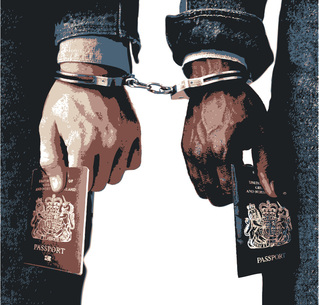
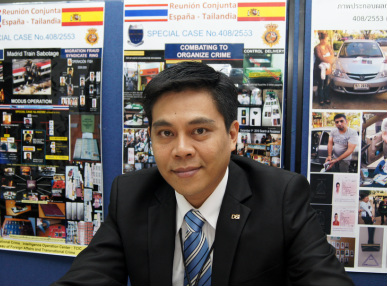
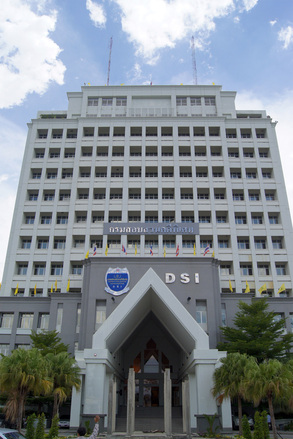
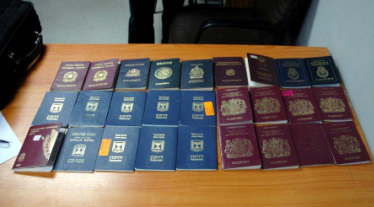
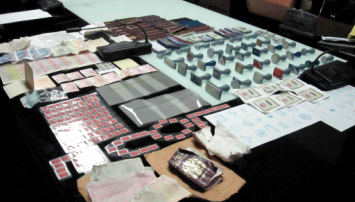
 RSS Feed
RSS Feed
















